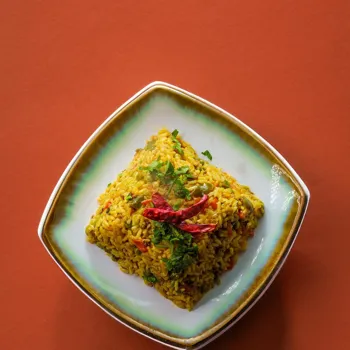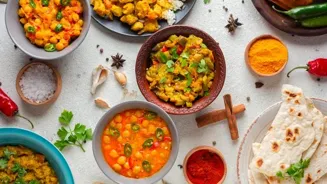Unraveling India's Culinary Tapestry: A Journey Through Food and Culture. Dive into a world where every bite tells a story
India, a land of vibrant colours, diverse languages, and rich traditions, boasts
a cultural tapestry woven intricately with the threads of its culinary heritage.
Food here is far more than just sustenance; it's a celebration of life, a reflection of regional identities, and a powerful symbol of community. Every dish, every spice blend, tells a story – a story of history, geography, and the enduring spirit of the Indian people.
Exploring the connection between food and culture in India is like embarking on a fascinating journey through time and tradition, where each bite offers a glimpse into the soul of this incredible nation.
India's diverse culinary landscape reflects regional ingredients and cultural influences
The culinary landscape of India is as diverse as its geography. From the snow-capped Himalayas to the sun-kissed beaches of the south, each region boasts its own unique culinary identity, shaped by local ingredients, climate, and historical influences.
In the north, you'll find hearty dishes like chana masala and aloo paratha, reflecting the region's agricultural abundance. As you move eastward, the flavours become more nuanced, with an emphasis on fermented foods and fresh herbs.
Down south, coastal cuisine dominates with coconut, rice, and an array of spices. This diversity is not just about different ingredients; it's about different ways of life, different perspectives, all expressed through the medium of food.
Indian festivals revolve around food, uniting families and communities in joyous celebrations
Food plays a central role in Indian festivals and celebrations. Whether it's the elaborate feasts of Diwali, the sweet treats of Holi, or the traditional dishes of Onam, food is an integral part of the festivities, bringing families and communities together in joyous gatherings.
Each festival has its own signature dishes, prepared with love and devotion, and shared with friends and neighbours. These culinary traditions are passed down through generations, preserving cultural identity and reinforcing social bonds.
The act of sharing food during festivals is a symbol of goodwill, unity, and the spirit of togetherness that is so integral to Indian culture.
Understanding Indian food through the concept of "rasa" essence
The concept of "rasa" is fundamental to understanding the Indian approach to food. Rasa, derived from Sanskrit, refers to the emotional essence or flavour of a dish.

It's not just about the taste of the food; it's about the overall experience – the aroma, the texture, the presentation, and the emotions it evokes.
Traditional Indian cooking aims to create a harmonious balance of different rasas, resulting in a dish that is not only delicious but also nourishing and satisfying.
This holistic approach to food reflects a deep understanding of the connection between food, mind, and body, and is a testament to the wisdom of ancient Indian culinary traditions.
Indian cuisine: Spices enhance flavor and bring health benefits, passed down through generations
The use of spices is another defining characteristic of Indian cuisine. Spices are not just flavour enhancers; they are also believed to have medicinal properties.
Turmeric, ginger, cumin, coriander, and cardamom are just a few of the many spices that are used extensively in Indian cooking, each bringing its own unique flavour and health benefits.
The art of blending spices is a skill that is passed down through generations, with each family having its own secret recipes and techniques. The use of spices is not just about adding flavour; it's about creating a symphony of tastes and aromas that stimulate the senses and nourish the body.
The deep connection between food and culture in India
In conclusion, the connection between food and culture in India is profound and multifaceted. Food is not just a necessity; it's a celebration of life, a reflection of regional identities, and a powerful symbol of community.
Exploring the culinary heritage of India is like embarking on a journey through time and tradition, where each dish offers a glimpse into the soul of this incredible nation.
From the diverse flavours of the different regions to the symbolic significance of food in festivals and celebrations, every aspect of Indian cuisine is deeply rooted in its culture.
The art of Indian cooking is a testament to the wisdom and creativity of the Indian people and a reminder of the importance of preserving our culinary traditions for future generations.
Indian cuisine reflects rich cultural tapestry, history, unity
India, a land famed for its diverse landscapes and traditions, finds its cultural identity deeply interwoven with its rich culinary heritage. Food here transcends basic nourishment; it embodies celebrations, mirrors regional distinctiveness, and serves as a potent emblem of communal unity.
Each recipe, each aromatic spice blend, unravels a narrative – a tale of bygone eras, geographical nuances, and the unwavering strength of the Indian populace.
To delve into the relationship between Indian cuisine and its culture is to embark on an enthralling odyssey through time itself, where every morsel provides a window into the nation's very core.
India's diverse culinary spectrum reflects geographical regions
India's culinary spectrum mirrors the country's geographical diversity. From the towering Himalayan peaks to the sun-kissed southern coasts, each area boasts unique delicacies shaped by local ingredients, climate and history.
The north offers robust dishes like aloo paratha and chana masala, reflecting agricultural abundance. Eastwards, subtle flavors emerge, emphasizing fermented foods and herbs. Southern coastal cuisine thrives on rice, coconut, and spices.
This isn't just ingredient variation; it's diverse lifestyles and perspectives manifested.
Indian festivals celebrate culinary art, fostering unity through signature dishes
Festivals bring out the best in India's culinary art. From Diwali's feasts to Holi's sweets and Onam's traditional fare, food unites loved ones in joyful settings. Every celebration has signature dishes, prepared with devotion and shared widely.
These recipes preserve culture, strengthen relationships, and symbolize goodwill and unity -- cornerstones of Indian identity.
India's gastronomic philosophy focuses on 'rasa' essence beyond taste
The essence of 'rasa' is central to India's gastronomic philosophy. It explores the flavor beyond mere taste, encompassing aroma, texture, and emotional responses. Traditional cooking strives for balanced 'rasas,' yielding nourishment, satisfaction, and palatability.
This holistic approach mirrors the interconnectedness of food, mind and body, demonstrating ancient culinary wisdom.
Indian gastronomy thrives on spices for flavor, health benefits, and culinary art
Essential to Indian gastronomy is spice. Beyond flavor, these ingredients offer health benefits. Cardamom, cumin, turmeric, ginger, coriander and many more define Indian kitchens. Passed down through generations, mixing spices becomes an art, each family holding secrets.
This enhances flavor, stimulates the senses and nourishes, embodying culinary mastery.
Food and culture intertwine deeply in Indian heritage
In conclusion, food and culture connect profoundly in India. More than sustenance, it's joy, regional reflection, and communal symbol. Exploring this heritage is a historical journey revealed in every dish. From diversity to festivals, its culinary depth intertwines with culture.
Indian cooking showcases ingenuity, valuing tradition for generations.
AI Generated Content. Glance/InMobi shall have no liability for the content














